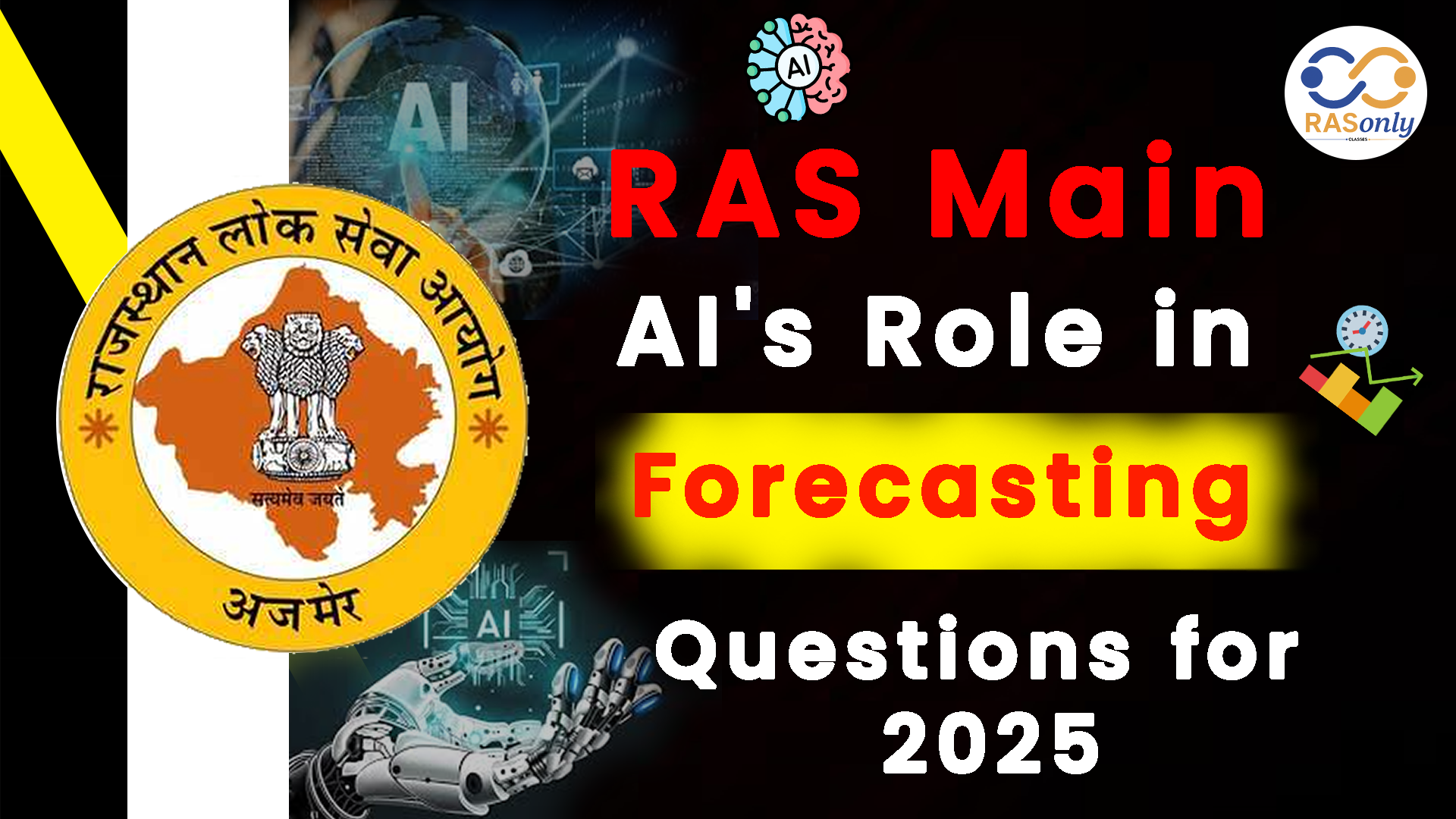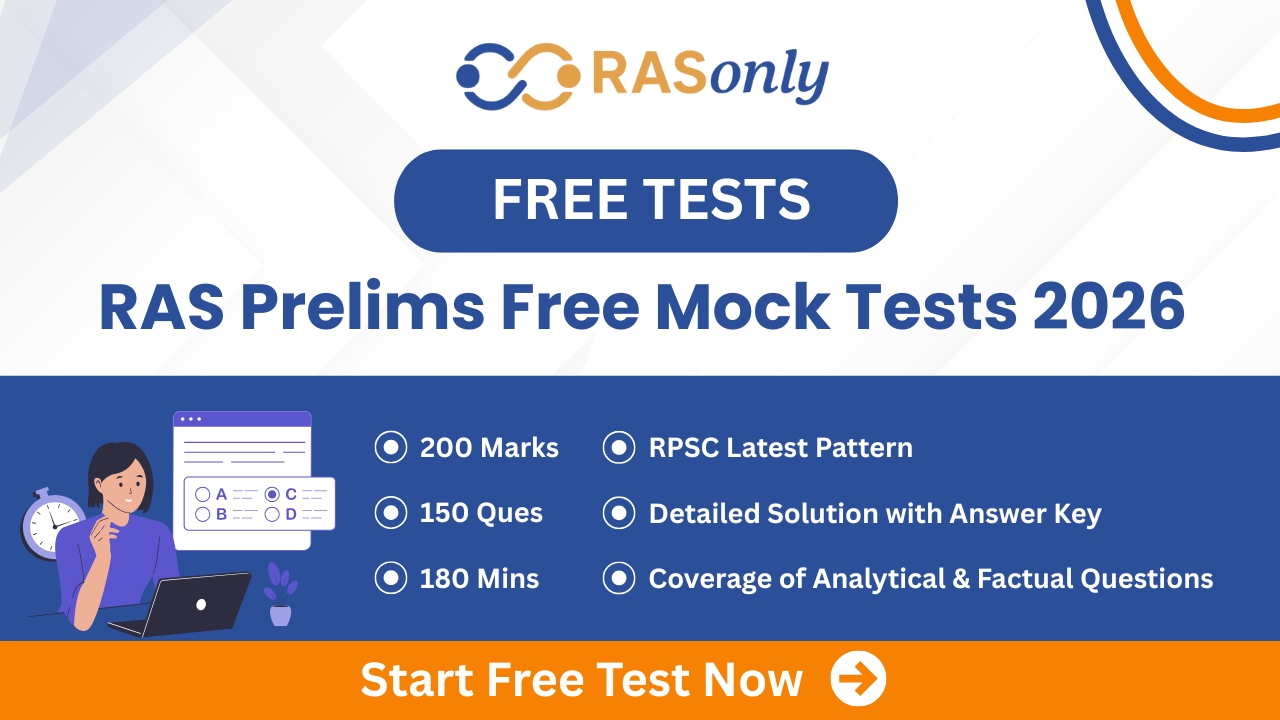Empowered Panchayats, Prosperous Rural Rajasthan
- >
- Preparation Tips
- >
- AI's Role in Forecasting RAS Main Questions for 2025
AI's Role in Forecasting RAS Main Questions for 2025

Get in Touch with RASonly!

AI is transforming RAS Main 2026 preparation by analyzing past papers, syllabus trends, and current affairs to predict high-priority topics. It helps aspirants save time, focus on important areas, and personalize study plans. However, AI predictions should be used as a supportive tool alongside conceptual clarity, answer writing practice, and comprehensive syllabus coverage for balanced and effective preparation.

The Rajasthan Administrative Services (RAS) Main Exam stands as India's top competitive examination and the upcoming RAS Main 2026 examination leads candidates to seek better preparation methods. Students usually study through mixed materials along with guessing potential exam questions but this combination usually takes too much time and yields inconsistent results. The development of Artificial Intelligence (AI) produces a revolutionary tool to transform candidate preparation methods. AI systems perform big data analysis to generate believable predictions about RAS Main 2026 exam questions, which would help students direct their study activities towards high-priority areas. This article will investigate AI forecasting of RAS Main questions for 2026 as well as explain AI prediction methods along with discussing both the advantages and challenges of AI-based competitive exam preparation.
AI and its Potential for Predicting RAS Main Questions
Artificial Intelligence (AI) presents a sophisticated way of answering the RAS Main 2026 exam questions based on the pattern recognition within the previous examinations. AI uses historical exam data to identify patterns that keep reoccurring, allowing it to predict which subjects and what types of questions would be included in the next RAS Main 2026 test. AI allows candidates to invest their learning in valuable areas, which increases their learning productivity and confidence. The preparation of studies will be more efficient following personal recommendations that are produced by AI-based tools.
| AI Capabilities | Description |
|---|---|
| Data Analysis | AI analyzes previous years' RAS Main papers and current trends to predict future questions. |
| Pattern Recognition | AI identifies recurring themes and topics, highlighting which areas are most likely to appear in the exam. |
| Real-Time Trend Analysis | AI adapts to current events, politics, and socio-economic developments to predict exam questions accurately. |
| Personalized Study Recommendations | AI-powered platforms offer customized study plans based on individual strengths, weaknesses, and predicted topics. |
Process of AI-Based Question Prediction
Artificial Intelligence follows a rigorous data-based methodology to forecast questions that will appear on the RAS Main 2026 examination. AI's Role in Forecasting RAS Main Questions is achieved through the combination of machine learning algorithms and natural language processing techniques to analyze historical datasets composed of RAS Main question papers and current affairs with syllabus information. The AI model performs successive stages to identify the most likely exam questions which helps students prepare more effectively for their tests;
- Step 1: Data Collection: The prediction of questions using AI starts with the collection of a large database with appropriate information. The training data used in predicting questions through AI has been gathered from both former RAS Main question papers and syllabus revisions and current news articles. AI is able to utilize past exam question banks because it uses them as historical evidence to produce a large database.
- Step 2: Data Preprocessing: Data that has been collected must be preprocessed before analyzing. Raw data are often in the form of useless content and inconsistent materials, as well as outdated information. This is where AI will carry out data cleaning tasks to remove noises and unusable data points and only the relevant information that is fresh will be available to conduct research.
- Step 3: Pattern Identification: Pattern identification is the next step in the AI process, which should be used once the preprocessing activities are successfully completed. Uncommon topics along with question structure and theme are identified by the AI system based on highly developed algorithms and machine learning is implemented on previous data. AI uses this stage in order to identify recurring patterns of questions that were asked in previous RAS Main exams.
- Step 4: Trend Analysis: Analysis conducted by AI extends beyond previous exam assessments. The prediction system uses real-time trends to incorporate ongoing political matters economic innovations and environmental modifications. AI utilizes real-time data from newspapers and journals alongside online sources to update its predictions to match the most important and recently emerged topics likely to appear in RAS Main 2026.
- Step 5: Model Training: During this period the AI model conducts machine learning algorithm-based training sessions. Artificial intelligence notices hidden associations between different topics and question types using the data. Through training the model can identify past patterns and make predictive outcomes accurately.
- Step 6: Prediction Generation: AI uses processed training data together with the trained model to predict RAS Main 2026 examination questions. AI uses patterns and trends alongside data correlations that were discovered within the analyzed historical data to produce predictions. The system provides a set of possible topics along with question structures showing the most probable questions for the upcoming exam.
Case Studies and Examples of AI in Exam Preparation
,p>AI helps students achieve better results in competitive exams through advanced and optimized predictive solutions to identify important exam subjects. AI has established a presence in exam preparation globally, which indicates its capabilities for RAS Main 2026. The following section presents common examples of Artificial Intelligence applications that enhance exam preparation along with guidance for test aspirants.
AI in Predicting Exam Patterns and Topics
AI's Role in Forecasting RAS Main Questions utilizes educational domain subjects to analyze historical question papers while tracing syllabus trends and current affairs topics that help generate exam topic predictions. AI-powered platforms scan past yearly records to detect repeating question patterns, which helps them discover exam zones that stand a high chance of appearing again in the next examinations. Through machine learning technologies these platforms evaluate topic occurrences to help students concentrate on essential knowledge blocks for their studies effectively.
Personalized Learning Platforms
Artificial Intelligence has transformed the strategy of individual learning in exam preparation processes. Students can now access AI-based platform algorithms that generate individualized study course options. The evaluation system examines individual aptitudes and weaknesses by using test outcomes in combination with study methods and educational progression data. Educational recommendations provided by AI systems enable students to focus on their problem areas alongside their areas of strength, thus developing a more strategic study method.
Current Affairs Integration
AI platforms link current affairs together with both educational content and previous examination questions. AI analysis of current political economics and worldwide events enables the prediction of prospective examination inclusion for these topics. The academic development tracking capability of AI is used to track progress in academics to offer new topic-based practice questions and study content to the students. This solution is beneficial to RAS Main 2026 candidates, and they can simply combine real-time news events with their study strategy in order to make their preparation up-to-date and relevant to the changes.
Data-Driven Insights for Exam Strategies
AI's Role in Forecasting RAS Main Questions provides information about the most effective strategies for taking exams. Through system tracking candidates receive information about which exam sections possess greater importance as well as students' performance in those sections to help them optimize their approach. Students can use AI-generated data to determine that some exam topics appear with increased testing frequency so their preparation effort can be shifted accordingly. Time-bound mock exams supported by AI tools enable students to do simulated exams under real test conditions thus developing their proficiency in time management during actual assessments.
Benefits and Limitations of Using AI for RAS Main Prediction
AI enhances RAS Main 2026 exam preparation through two benefits, which consist of targeted topic concentration and individualized learning tracks. The use of historical data presents limitations for exam preparation because the actual exam pattern could change independently from records. Knowledge about AI strengths and weaknesses becomes essential for implementing AI systems effectively in exam study activities.
| Benefits | Limitations |
|---|---|
| Targeted Study: AI technology directs students toward important subjects that increase their study effectiveness. | Dependence on Historical Data: AI prediction systems rely on past examination patterns and may miss sudden changes in exam format or topics. |
| Personalized Learning: AI tailors study plans to match individual learning capacity and improvement areas. | Lack of Flexibility: Unexpected syllabus changes are difficult for AI models to adapt to quickly. |
| Time Efficiency: AI helps save time by filtering out less relevant topics and shortening preparation duration. | Over-Reliance on AI: Excessive dependence may limit development of diverse exam strategies. |
Preparing for the RAS Main 2026: Should AI Predictions Be the Focus?
RAS Main 2026 exam candidates face a choice regarding their utilization of AI predictions during their preparation. AI prediction tools deliver helpful knowledge yet students must understand these predictions do not substitute the best student preparation methods. Students who use AI predictions alongside conventional preparation techniques will gain the most beneficial results. This section evaluates whether AI should lead preparation activities or if a wider approach should be taken;
1. AI as a Supplementary Tool, Not the Sole Strategy
Your examination preparation will advance effectively through AI predictions which allow you to focus on subjects that tend to appear in RAS Main 2026 assessment tests. The use of AI should complement traditional preparation methods which involve concept mastery and paper practice alongside up-to-date knowledge acquisition. When using predictive AI tools you gain access to historical information and established patterns yet the exam may develop entirely new challenges beyond these initial parameters.
2. Comprehensive Study Plan
Your study plan should include AI predictions about topic probabilities but needs the additional components of conceptual understanding along with writing skill development for RAS Main GS papers and multi-faceted question management. For RAS Main 2026, current affairs hold great importance yet AI still fails to reproduce the deep understanding needed to study governance along with the economy and Indian polity.
3. The Importance of Adaptability
RAS Main exam questions are pulled from an extensive syllabus combination of geography, history, environment, and contemporary events content. The predictive analytics performed by AI depend on analyzing historical records while remaining unable to predict entirely new emphasis areas emerging from recent developments in the academic field. Restricted use of AI predictions might result in exam-day uncertainty because they cannot account for unpredictable innovations. Organizing your exam preparation through AI predictive tools and a whole-syllabus study will help you stay adaptable while remaining resilient during exam preparation.
4. Time Management and Stress Reduction
The main advantage of AI implementation is its assistance with efficient time management. The focus on the most crucial subjects through AI helps decrease students' feeling of being drowned by their extensive course load. The key requires a proper balance between efforts. Paying excessive attention to AI-generated content can create weakness in your knowledge of the other subjects you learn. To maximize the benefits of AI tools review the recommended topics but remember to dedicate adequate time for thorough study of lower-testing subject matters.
Conclusion
AI's Role in Forecasting RAS Main Questions provides valuable guidance but studying exclusively for these predictions should not replace your wider preparation approach. Using AI predictions alongside traditional study methods, past paper practice, and current affairs knowledge will maximize your chances of succeeding in the examination. Your ideal test preparation starts and ends with the fundamental abilities of adaptability time management and clear conceptual understanding.
Post Category
- RAS Salary
- Result
- RAS Admit Card
- RAS Job
- RAS Cutoff
- Preparation Tips
- RAS Answer Key
- RAS Exam Analysis
- RAS Syllabus
- RAS Previous Year Papers
- RPSC RAS Exam Pattern
- RAS Interview
- RAS Mains Exam Date
- RAS Vacancy
- RAS Test Series
- RAS Best Books
- RAS Preparation Resources
- RAS Coaching Centre
- History
- Polity
- Geography
- Economics
- Science
- Art and Culture
- RPSC RAS Application Form
- RPSC RAS Notification
RASonly Interview Guidance Program

Mr. Ashok Jain
Ex-Chief Secretary Govt of Rajasthan
- IAS officer of the 1981 batch, Rajasthan cadre.
- Passionate about mentoring the next generation of RAS officers with real-world insights.
- Got retired in Dec 2017 from the post of Chief Secretary of the state of Rajasthan.

Mr. Guru Charan Rai
Ex-ASP / SP in Jaisalmer
- Guru Charan Rai, IPS (Retd), retired as Inspector General of Police (Security), Rajasthan, Jaipur in 2017.
- Served as ASP and SP in Jaisalmer, Nagaur, Sri Ganganagar, Sawai Madhopur, Dausa, Sikar, and Karauli.
- He also held key positions as DIGP and IGP in the Law and Order division.

Mr. Rakesh Verma
Ex-IAS Officer, B.Tech, MBA, and M.A. (Economics)
- IAS officer of the 1981 batch and retired in Chief Secretary Rank.
- Civil servant of high repute and vast experience.
- Has been teaching UPSC CSE subjects for the last six years.
Related Post
Daily Current Affairs for RAS Exam Preparation 2026

Jaipur to Host First BRICS FMCBG Meeting
February 24, 2026
Rajasthan to Boost Skill Training in Border Districts
February 24, 2026
Rajasthan Passes Forest Grants, Boosts Aravalli Conservation
February 24, 2026
NAI Rajasthan World Heritage Exhibition at JKK
February 23, 2026👉🏻 Register Today to Join Classes! 👍🏻
- Team RASOnly -
🎯 Benefits of RASOnly Coaching:
- ✅ 1:1 Mentorship with RAS Officers
- ✅ Experienced and Expert Faculty
- ✅ Free Library Access
- ✅ Daily Minimum 4 Hours Must
- ✅ Comprehensive Study Material
- ✅ Regular Tests & Performance Analysis
- ✅ Personalized Guidance & Doubt Solving
- ✅ Online & Offline Class Options
- ✅ Affordable Fees with Quality Education
Key Highlights:
- 👉🏻 3-Day Refund Policy
- 👉🏻 New Batch Starting from 04 August
- 👉🏻 Registration Amount: Only ₹1000









